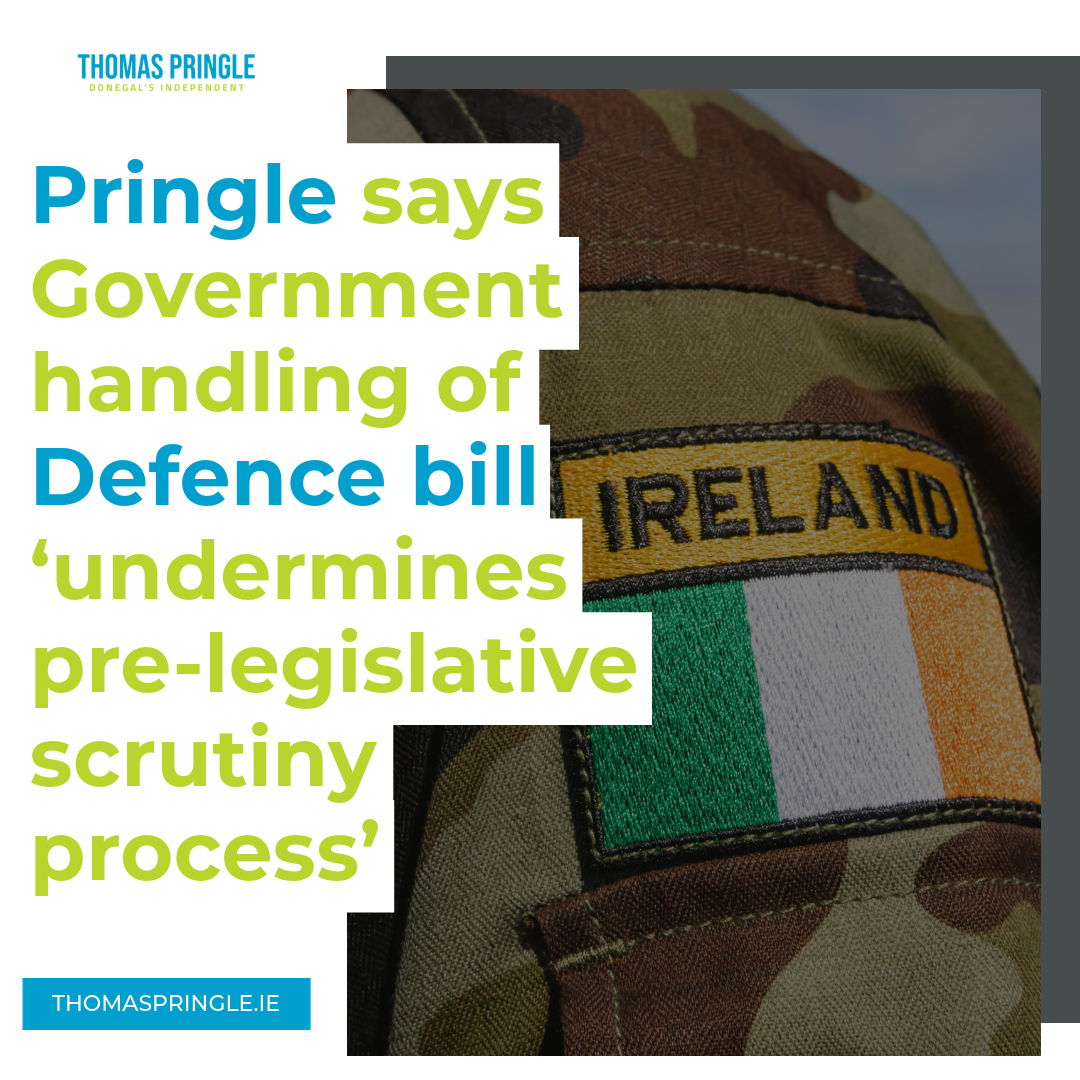- Pringle: We need a policy that recognises the importance of inshore fishing
- Pringle: Disabled people and carers face crisis of State neglect
- Pringle: Failed FF/FG housing policies forcing people to put their lives on hold
- Pringle welcomes Donegal council motion on Occupied Territories Bill: ‘We cannot stand by in the face of genocide’
Pringle says Government handling of Defence bill ‘undermines pre-legislative scrutiny process’
- Updated: 2nd May 2024

Independent TD for Donegal, Thomas Pringle criticised Government’s handling of the Defence bill, saying the bill could have been stronger if issues raised at committee had been taken on board.
Addressing the Dáil today, Deputy Pringle said: “I would like to start by condemning the way this government has been treating legislation and the legislative process throughout its term in government. At the Business Committee last week, I highlighted the fact that neither the bill nor pre-legislative scrutiny of the bill was published, despite the fact that it was due for debate this week. The bill wasn’t published until last Thursday afternoon and the pre-legislative scrutiny was published after this, on Friday.
“This completely undermines the whole pre-legislative scrutiny process. What is the point of the committee’s process of consulting with organisations and trade unions affected by legislation when none of its findings are taken on board?” he said. He raised the same issue in Wednesday’s debate on Supports for Survivors of Residential Institutional Abuse Bill 2024 and said: “This Government treats consultation as a tick box rather than a meaningful engagement with the people at the heart of the issue.”
The deputy was speaking on Defence (Amendment) Bill 2024.
Deputy Pringle said: “This legislation and cultural transformation of the Defence Forces is long overdue. It has been over 20 years since the Independent Monitoring Group was established to oversee the implementation of recommendations from a report detailing the bullying, harassment and sexual harassment across the Defence Forces. The Women of Honour have long been calling for reform, but despite many reports and review groups, significant issues still remain across the Defence Forces.
“Recommendations such as the recruitment and participation of under-represented groups, proper and meaningful consultation with communities of underrepresented groups and achieving a 35% female participation rate should be implemented, as well as better pay for those in our Defence Forces. All these plans to increase the capacity of the Defence Forces will not work unless the pay is addressed,” he said.
The deputy said: “I am concerned with the extent of the plans to increase the Defence Forces’ capability from our current capability, described by the Commission on the Defence Forces as Level of Ambition 1, to Level of Ambition 2 in six years, and then presumably on to Level of Ambition 3 after that. The Commission Report outlines that when LOA 2 is achieved, the Defence Forces will have the ability to ‘deal with an assault on Irish sovereignty’.
“Interestingly then, LOA 3 will see them ‘developing full spectrum defence capabilities to protect Ireland and its people to an extent comparable to similar sized countries in Europe’. What exactly is the goal here?” he said, and added: “I am very concerned about the ambition for our Defence Forces to be like other European countries our size. What is this obsession with being just like everyone else in Europe?”
Deputy Pringle said: “This government and the Minister constantly undervalue the role we play on the international stage. I have said this many times, but our neutrality and our peacekeeping efforts are very valued by those we assist abroad and by our own citizens at home. Ireland has often been seen as a voice of reason because of our neutrality. We have nothing to contribute by building armies like other European countries or by being part of some future EU army. We are respected internationally and the only people who seek to undermine that are European leaders with a vested interest.
“I hope the Minister, when considering the reform of the Defence Forces, remembers this and begins to value it as much as our citizens do,” he said.
He said: “There is no doubt that there are changes needed to this bill. The Minister would have known this had he waited for the Committee to publish pre-legislative scrutiny before publishing it. I would like to echo the Women of Honor’s concerns regarding the representation of the Department of the Defence on the External Oversight Body that this legislation provides for the establishment of on a statutory basis.
“I am concerned with the language in the bill, the use of the word ‘may’ in particular. For example, the Minister of Defence ‘may’ consult with the External Oversight Body prior to making appointments and the Minister of Defence ‘may’ consult with the EOB regarding the promotion of an officer. This is very non-committal language and should be strengthened if the External Oversight Body is to have the role it is envisioned to have,” he said.
Deputy Pringle concluded: “These are issues that were raised at Committee meetings and if these issues were listened to and addressed, we would be looking at much stronger legislation than has been put forward today.”



